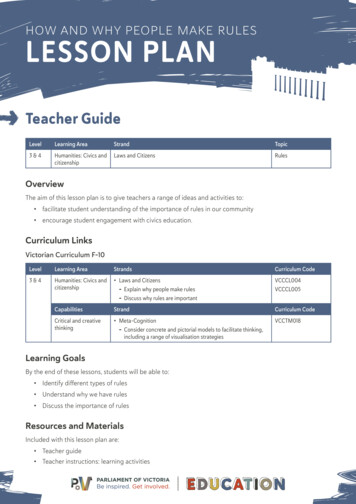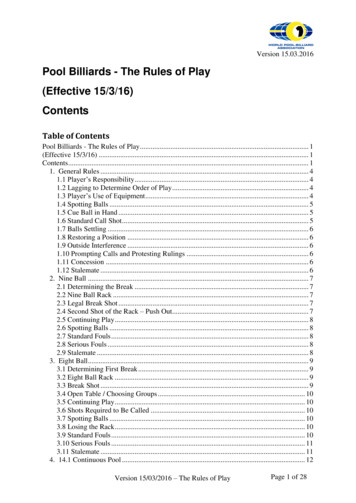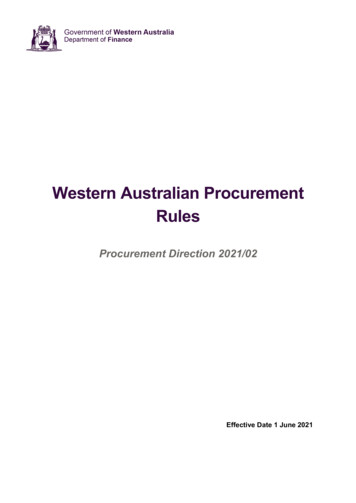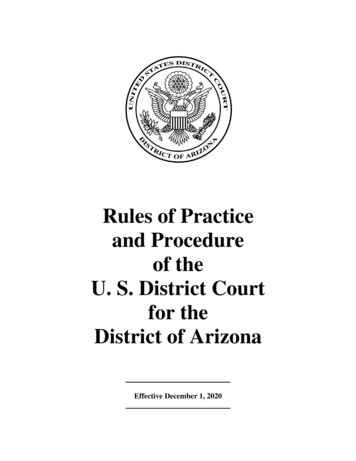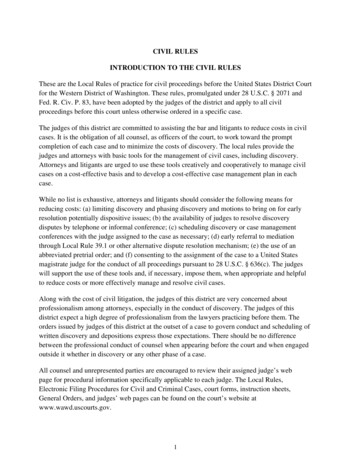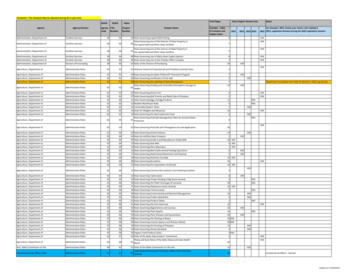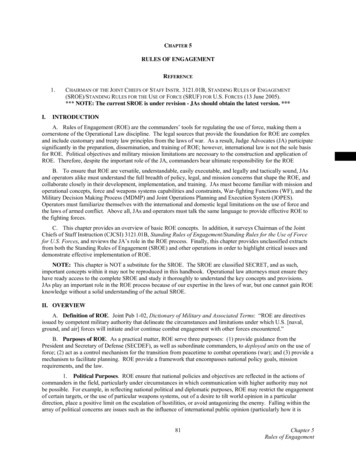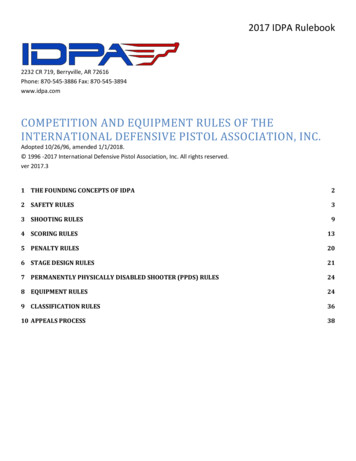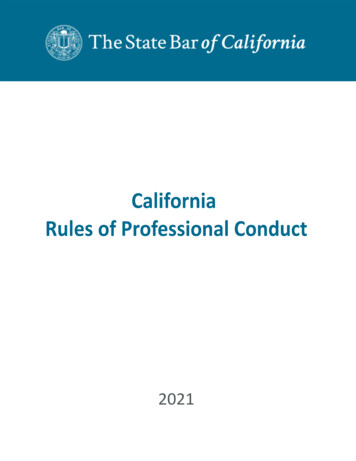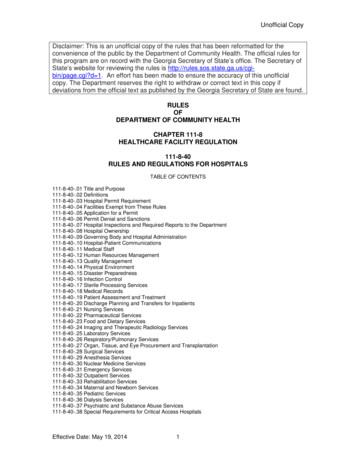
Transcription
Unofficial CopyDisclaimer: This is an unofficial copy of the rules that has been reformatted for theconvenience of the public by the Department of Community Health. The official rules forthis program are on record with the Georgia Secretary of State’s office. The Secretary ofState’s website for reviewing the rules is http://rules.sos.state.ga.us/cgibin/page.cgi?d 1. An effort has been made to ensure the accuracy of this unofficialcopy. The Department reserves the right to withdraw or correct text in this copy ifdeviations from the official text as published by the Georgia Secretary of State are found.RULESOFDEPARTMENT OF COMMUNITY HEALTHCHAPTER 111-8HEALTHCARE FACILITY REGULATION111-8-40RULES AND REGULATIONS FOR HOSPITALSTABLE OF CONTENTS111-8-40-.01 Title and Purpose111-8-40-.02 Definitions111-8-40-.03 Hospital Permit Requirement111-8-40-.04 Facilities Exempt from These Rules111-8-40-.05 Application for a Permit111-8-40-.06 Permit Denial and Sanctions111-8-40-.07 Hospital Inspections and Required Reports to the Department111-8-40-.08 Hospital Ownership111-8-40-.09 Governing Body and Hospital Administration111-8-40-.10 Hospital-Patient Communications111-8-40-.11 Medical Staff111-8-40-.12 Human Resources Management111-8-40-.13 Quality Management111-8-40-.14 Physical Environment111-8-40-.15 Disaster Preparedness111-8-40-.16 Infection Control111-8-40-.17 Sterile Processing Services111-8-40-.18 Medical Records111-8-40-.19 Patient Assessment and Treatment111-8-40-.20 Discharge Planning and Transfers for Inpatients111-8-40-.21 Nursing Services111-8-40-.22 Pharmaceutical Services111-8-40-.23 Food and Dietary Services111-8-40-.24 Imaging and Therapeutic Radiology Services111-8-40-.25 Laboratory Services111-8-40-.26 Respiratory/Pulmonary Services111-8-40-.27 Organ, Tissue, and Eye Procurement and Transplantation111-8-40-.28 Surgical Services111-8-40-.29 Anesthesia Services111-8-40-.30 Nuclear Medicine Services111-8-40-.31 Emergency Services111-8-40-.32 Outpatient Services111-8-40-.33 Rehabilitation Services111-8-40-.34 Maternal and Newborn Services111-8-40-.35 Pediatric Services111-8-40-.36 Dialysis Services111-8-40-.37 Psychiatric and Substance Abuse Services111-8-40-.38 Special Requirements for Critical Access HospitalsEffective Date: May 19, 20141
Unofficial Copy111-8-40-.39 Special Requirements for Rural Free Standing Emergency Departments111-8-40-.40 Physical Plant Design and Construction111-8-40-.41 Requests for Waiver or Variance111-8-40-.42 Enforcement of Rules and Regulations111-8-40-.43 Severability of These Rules111-8-40-.01 Title and Purpose.These rules shall be known as the Rules and Regulations for Hospitals. The purposeof these rules is to provide for the inspection and issuance of permits for hospitals and toestablish minimum requirements for facilities operating under a hospital permit.Authority: O.C.G.A. §§ 31-2-4, 31-2-5, 31-7-2.1 and 31-7-3.111-8-40-.02 Definitions.Unless a context otherwise requires, these identified terms mean the following whenused in these rules:(a) Board certified means current certification of a licensed physician by a specialtyboard recognized by the American Board of Medical Specialties (ABMS) or AmericanOsteopathic Association (AOA) or other nationally recognized specialty’s certifyingboard.(b) Board eligible means a licensed physician who meets the criteria for examinationfor the designated specialty as published by that nationally recognized specialty’scertifying board.(c) Bylaws means a set of laws or rules formally adopted internally by the facility,organization, or specified group of persons to govern internal functions or practiceswithin that group, facility, or organization.(d) Department means the Department of Community Health of the State of Georgia.(e) Governing body means the hospital authority, board of trustees or directors,partnership, corporation, entity, person, or group of persons who maintain and controlthe hospital.(f) Hospital means any building, facility, or place in which are provided two (2) ormore beads and other facilities and services that are used for persons received forexamination, diagnosis, treatment, surgery, or maternity care for periods continuing fortwenty-four (24) hours or longer and which is classified by the department as a hospital.(g) Inpatient means a person admitted to a hospital for an intended length of stay oftwenty-four (24) hours or longer.(h) Rural Free Standing Emergency Department means any hospital thatdowngrades its existing scope of services to meet all of the following conditions:(i)is currently licensed by the Department as a hospital or was previouslylicensed by the Department as a hospital and such license expired withinthe previous 12 months;Effective Date: May 19, 20142
Unofficial Copy(ii)is located in a rural county as defined by O.C.G.A. § 31-6-2(32);(iii)is located no more than 35 miles from a licensed general hospital;(iv)is open 7 days a week, 24 hours a day;(v)provides non-elective emergency treatment and procedures for periodscontinuing less than 24 hours;(vi)may provide elective, out-patient surgical treatment and procedures forperiods continuing less than 24 hours;(vii) may provide basic obstetrics and gynecology treatment and proceduresfor periods continuing less than 24 hours; and(viii) is classified by the department, as provided for in this chapter, as a RuralFree Standing Emergency Department.Rural Free Standing Emergency Departments may provide elective endoscopyor other elective treatment and procedures which are not performed in anoperating room environment.(i) Medical record means the written or electronic collection of diagnostic and/ortreatment information and data pertaining to the patient, including but not limited toidentifying information and, as applicable, medical orders, assessment findings,diagnostic test results, progress notes, x-rays films, monitoring data, and details oftreatment.(j) Medical staff means the body of licensed physicians, dentists, and/or podiatrists,appointed or approved by the governing body, to which the governing body hasassigned responsibility and accountability for the patient care provided at the hospital.(k) Organized service(s) means any inpatient or outpatient service offered by thehospital which functions as an administrative or operational unit under the governingbody of the hospital.(l) Outpatient means a person who presents to a hospital for diagnostic or treatmentservices and who is not admitted to the hospital as an inpatient by a member of themedical staff.(m) Patient means any person presenting at a hospital for the purpose of evaluation,diagnosis, monitoring, or treatment of a medical condition, mental condition, disease, orinjury.(n) Peer review means the procedure by which professional health care providersevaluate the quality and efficiency of services ordered or performed by otherprofessional health care providers in the hospital for the purposes of fostering safe andadequate treatment of the patients and compliance with standards set by an associationof health care providers and with the laws, rules, and regulations applicable to hospitals.Effective Date: May 19, 20143
Unofficial Copy(o) Permit means the authorization granted by the Department to a hospitalgoverning body to operate the hospital’s authorized services.(p) Physical restraint means any manual method or physical or mechanical deviceused with a patient such that the patient’s freedom of movement or access to his/herown body is restricted.(q) Physician means any person who is licensed to practice medicine in this state bythe Georgia Composite State Board of Medical Examiners.(r) Practitioner means any individual engaged in the practice of the profession forwhich they are licensed, certified, or otherwise qualified or authorized to practice.(s) Professional staff means a person or persons licensed by the state of Georgia topractice a specified health profession and employed by or contracting with the hospitalfor the practice of that profession.(t) Rules and regulations means the set of rules formally adopted internally by aspecified hospital body to provide guidance for internal functions or practices.(u) Seclusion means the confinement of a person to a room or an area where theperson is prevented from leaving.(v) Surveillance means the systematic method of collecting, consolidating, andanalyzing data concerning the distribution and determinants of a given disease ormedical event, followed by the dissemination of that information to those who canimprove the outcomes.(w) The singular indicates the plural, the plural indicates the singular, and themasculine the feminine, when consistent with the intent of these rules.Authority: O.C.G.A. §§ 31-7-1, 31-7-2.1, 31-7-15 and 31-7-131.111-8-40-.03 Hospital Permit Requirement.No person, corporation, association, or other entity shall establish, operate, ormaintain a hospital in Georgia without a permit or provisional permit.(a) A permit is required for each hospital. Multi-building hospitals may request asingle permit to include all buildings provided that the hospital buildings are in closeproximity to each other, the facilities serve patients in the same geographical area, andthe facilities are operated under the same ownership, control, and bylaws.1. Services offered in separate buildings or on separate premises, which do notby themselves meet the definition of a hospital, including, but not limited to, satelliteurgent care centers, outpatient or mammography clinics, or hospital-owned physicians’offices, shall be considered organized services of the hospital for the purposes of theserules.2. Only those services operated by the hospital under the permit as approved bythe Department shall be presented to the public as a service of the hospital.Effective Date: May 19, 20144
Unofficial Copy(b) A permit, either continuing or provisional, is required prior to the admission of anypatients or initiation of any patient care services in the hospital. A provisional permit maybe issued for a limited time to a newly established hospital to allow the hospital todemonstrate that its operational procedures equal standards specified by the rules.(c) The permit shall designate the classification of the hospital as determined by theDepartment following evaluation of the hospital’s services and in accordance with theCertificate of Need.1. The classification shall be one of the following:(i) Classification as a general hospital means a facility meets the definition ofa hospital and provides continuous care for a variety of patients who have a variety ofmedical conditions. A critical access hospital shall fall under the general hospitalclassification;(ii) Classification as a specialized hospital means a facility that meets thedefinition of a hospital and provides care to a specialized or specified group of patientsand/or patients who have specified conditions. The type of specialization shall bedesignated on the hospital permit; or(iii) Classification as a Rural Free Standing Emergency Department.2. If changes occur in the organized services offered by the hospital, includingthe addition of any services requiring CON review or off-campus service locations, thehospital’s administrator or governing body shall submit to the Department a newdescription of services at least thirty (30) days prior to the change. Change in theclassification of the hospital shall require application for a new permit.(d) To be eligible for a permit the hospital shall be in substantial compliance withthese rules and regulations and any provisions of law as applicable to the constructionand operation of the hospital. In its discretion, the Department may issue a provisionalpermit for a limited time to a new or existing hospital to allow the hospital a reasonablelength of time to come into compliance with these rules provided the Department hasreceived an acceptable plan of correction.(e) The permit issued to the hospital shall be prominently displayed in a public areaof the hospital at all times.(f) A permit is not transferable from one governing body to another nor from onehospital location to another.(g) If the hospital anticipates that it will close or cease to operate, the governing bodyshall notify the Department at least thirty (30) days prior to the anticipated closure.1. Prior to hospital closure, the hospital shall inform the Department of theplanned storage location for patients’ medical records, medical staff information, andother critical information after closure. The hospital shall publish in a widely circulatednewspaper(s) in the hospital’s service area a notice indicating where medical recordsand other critical information can be retrieved and shall notify the Department ofEffective Date: May 19, 20145
Unofficial CopyTransportation of the anticipated date of closure for removal of the hospital locator signs.Following closure, the Department shall be notified of any change in location of thepatients’ medical records, medical staff information, and other critical information fromthe published location.2. When the hospital ceases to operate, the permit shall be returned to theDepartment within ten (10) days of closure. The permit shall be considered revoked,unless placed on inactive status as described in these rules.3. If the hospital is closing for a period of less than twelve (12) months, and plansto reopen under the same ownership, name, classification, and bed capacity, thehospital may request to have the permit placed on temporary inactive status.(i) When placed on temporary inactive status, the permit shall be returned tothe Department within ten (10) days of closure and the hospital shall not operate until thepermit has been reactivated. The hospital shall notify the Department of Transportationof the intended closure.(ii) The hospital shall request in writing that the permit be reactivated at leastthirty (30) days prior to the desired date of reopening. Prior to reactivation of the permit,the hospital may be subject to inspection by the Department. If the permit is notreactivated within twelve (12) months, the permit shall be considered revoked.(h) A new permit may be obtained by application to the Department and is required ifthe hospital is moved to another location, has a change in operational or trade name,has a change in ownership or classification, or has a change in the authorized bedcapacity. The former permit shall be considered revoked upon the issue of a new permitand the former permit shall be returned to the Department.(i) A permit shall remain in effect unless suspended or revoked or otherwiserescinded or removed as provided in these rules.Authority: O.C.G.A. §§ 31-7-1, 31-7-2, 31-7-2.1 and 31-7-3.111-8-40-.04 Facilities Exempt from These Rules.The following classes of hospitals are exempt from these rules:(1) Federally owned and/or operated hospitals. Hospitals owned or operated bythe federal government are exempt from these rules and the requirement for a Georgiahospital permit; and(2) Residential Mental Health Facilities for Children and Youth. A subclassification of specialized hospitals which are licensed to provide twenty-four (24) hourcare and have as their primary function the diagnosing and treating patients to agetwenty-one (21) with psychiatric disorders are exempt from these rules in lieu of meetingthe specific regulations under Chapter 111-8-68.Authority: O.C.G.A. §§ 31-2-7, 31-7-2 and 31-7-5.111-8-40-.05 Application for a Permit.Effective Date: May 19, 20146
Unofficial CopyAn application for a permit to operate a hospital shall be submitted on forms providedby the Department. The application submitted to the Department shall be an originaldocument. No application shall be considered by the Department unless it is completeand accompanied by all required attachments.(a) Application for Initial Permit. The application for an initial permit shall besubmitted to the Department not later than thirty (30) days prior to the anticipated date ofthe opening and initiation of operations by the hospital. The application shall be signedby the hospital administrator or the executive officer of the hospital’s governing body andshall include:1. A listing of the services provided:2. Proof of hospital ownership. In the case of corporations, partnerships, andother entities authorized by law, the applicant shall provide a copy of its certificate ofincorporation, or other acceptable proof of its legal existence together with the namesand addresses of all persons owning five (5) percent or more;3. A list of the locations of any services offered by the hospital on separatepremises; and4. A copy of the Certificate of Need (CON) from the Department.(b) Application Due to a Change in Name, Location, or Bed Capacity of aHospital. The application for a new permit due to a change in name, location, orauthorized bed capacity of a hospital shall be submitted at least thirty (30) days prior tothe proposed effective date of the change.(c) Application Due to a Change in Classification of the Hospital. The applicationfor a new permit due to a change in the classification for the hospital shall be submittedat least thirty (30) days prior to the proposed effective date of the change. Theapplication shall be signed by the hospital administrator or the executive officer of thegoverning body and shall include:1. A listing of the service(s) to be provided; and2. A copy of the required Certificate of Need (CON) from the Department, ifapplicable.(d) Application Due to a Change in Ownership. The application for a new permitdue to a change in ownership shall be submitted at least thirty (30) days prior to thechange whenever possible. Proof of ownership documents, as required with theapplication for the initial permit and any other approvals required by state law, shall besubmitted upon the completion of the transaction changing ownership.Authority: O.C.G.A. § 31-7-3.111-8-40-.06 Permit Denial and Sanctions.Effective Date: May 19, 20147
Unofficial CopyThe Department may refuse to grant an initial permit, revoke a current permit, orimpose other sanctions as described herein and in the rules for the “General Licensingand Enforcement Requirements,” Chapter 111-8-25.(a) Denial of an Application for a Permit. The Department may refuse to grant aninitial permit or provisional permit without the requirement of holding a hearing prior tothe action. Denial of an application for a change to a permit from an existing facility shallbe subject to notice and opportunity for a hearing following the denial. An applicationmay be refused or denied if:1. The hospital has failed to demonstrate compliance with these rules andregulations;2. The applicant or alter ego of the applicant has had a permit denied, revoked,or suspended within one (1) year of the date of a new application;3. The applicant has transferred ownership or governing authority of a hospitalwithin one (1) year of the date of the new application when such transfer was made inorder to avert denial, suspension, or revocation of a permit; or4. The applicant has knowingly made any verbal or written false statement(s) ofmaterial fact in connection with the application for the permit or on documents submittedto the Department as part of any inspection or investigation or in the falsification oralteration of facility records made or maintained by the hospital.(b) Sanction of a Permit.1. The Department may take an action to sanction the hospital permit holder,subject to notice and opportunity for a hearing, where the Department finds that thehospital has:(i) Knowingly made any verbal or written false statement of material facteither in connection with the application for the permit or on documents submitted to theDepartment as part of any inspection or investigation or in the falsification or alteration ofhospital records made or maintained by the hospital;(ii) Failed or refused, without legal cause, to provide the Department withaccess to the premises subject to regulation or information pertinent to the initial andcontinued licensing of the hospital;(iii) Failed to comply with the licensing requirements of this state; or(iv) Failed to comply with the provisions of O.C.G.A. § 31-2-8 or Rules forGeneral Licensing and Enforcement Requirements, Chapter 111-8-25.2. Such sanctions may include any one or more of the following:(i) Administration of a public reprimand;(ii) Suspension of the permit;Effective Date: May 19, 20148
Unofficial Copy(iii) Prohibition of persons in management or control;(iv) Imposition of civil penalties as provided by law; and(v) Revocation of the permit.(c) If the sanction hearing process results in revocation of the permit, the permit shallbe returned to the Department.Authority: O.C.G.A. §§ 31-2-8 and 31-7-1 et seq., and the Rules for General Licensingand Enforcement Requirements, Chapter 111-8-25.111-8-40-.07 Hospital Inspections and Required Reports to the Department.(1) Inspections by the Department. The hospital shall be available during all hoursof operation for observation and examination by properly identified representatives of theDepartment.(a) Initial Inspection. There shall be an initial inspection of a hospital prior to theopening date in order to determine that the hospital is in substantial compliance withthese rules. Prior to this initial inspection, the hospital shall submit to the Department:1. A copy of the certificate of occupancy;2. Verification of building safety and fire safety from local and stateauthorities; and3. Evidence of appropriate approvals by the state architect.(b) Periodic Inspections. The hospital shall be subject to periodic inspections todetermine that there is continued compliance with these rules, as deemed necessary bythe Department.(c) Random Inspections. The hospital may be subject to additional or morefrequent inspections by the Department where the Department receives a complaintalleging a rule violation by the hospital or the Department has reason to believe that thehospital is in violation of these rules.(d) Plans of Correction. If violations of these licensing rules are identified, thehospital will be given a written report of the violation that identifies the rules violated. Thehospital shall submit to the Department a written plan of correction in response to thereport of violation, which states what the hospital will do, and when, to correct each ofthe violations identified. The hospital may offer an explanation or dispute the findings orviolations in the written plan of correction, so long as an acceptable plan of correction issubmitted within ten (10) days of the hospital’s receipt of the written report of inspection.If the initial plan of correction is unacceptable to the department, the hospital will beprovided with at least one (1) opportunity to revise the unacceptable plan of correction.The hospital shall comply with its plan of correction.(e) Accreditation in Place of Periodic Inspection. The Department may acceptthe accreditation of a hospital by the Joint Commission on the Accreditation ofEffective Date: May 19, 20149
Unofficial CopyHealthcare Organizations (JCAHO), the American Osteopathy Association (AOA), orother approved accrediting body, in accordance with specific standards determined bythe Department to be substantially equivalent to state standards, as representation thatthe hospital is or remains in compliance with these rules.1. Hospitals accredited by an approved accrediting body shall present to theDepartment a copy of the full certification or accreditation report each time there is aninspection by the accreditation body and a copy of any reports related to the hospital’saccreditation status within thirty (30) days of receipt of the final report of the inspection.2. Hospitals accredited by an approved accrediting body are excused fromperiodic inspections. However, these hospitals may be subjected to random inspectionsby the Department for continuation of the permit when:(i) A validation study of the accreditation process is necessary;(ii) There has been a complaint alleging a rule violation which theDepartment determines requires investigation;(iii) The Department has reason to believe that there is a patient incidentor situation in the hospital that presents a possible threat to the health or safety ofpatients; or(iv) There are additions to the services previously offered by the hospitalwhich the Department determines requires an on-site visit.(2) Required Reports to the Department.(a) Patient Incidents Requiring Report.1. The hospital’s duly constituted peer review committee(s) shall report to theDepartment, as required below, whenever any of the following incidents involvinghospital patients occurs or the hospital has reasonable cause to believe that a reportableincident involving a hospital patient has occurred:(i) Any unanticipated patient death not related to the natural course of thepatient’s illness or underlying condition;(ii) Any rape which occurs in a hospital;(iii) Any surgery on the wrong patient or the wrong body part of thepatient; and(iv) Effective three (3) months after the Department provides writtennotification to all hospitals the hospital’s duly constituted peer review committee(s) shallalso report to the Department, whenever any of the following incidents involving hospitalpatients occurs or the hospital has reasonable cause to believe that a reportable incidentinvolving a hospital patient has occurred:(I) Any patient injury which is unrelated to the patient’s illness orunderlying condition and results in a permanent loss of limb or function;Effective Date: May 19, 201410
Unofficial Copy(II) Second or third degree burns involving twenty (20) percent ormore of the body surface of an adult patient or fifteen (15) percent or more of the bodysurface of a child which burns were acquired by the patient in the hospital;(III) Serious injury to a patient resulting from the malfunction orintentional or accidental misuse of patient care equipment;(IV) Discharge of an infant to the wrong family;(V) Any time an inpatient, or a patient under observation status,cannot be located, where there are circumstances that place the health, safety, orwelfare of the patient or others at risk and the patient has been missing for more thaneight (8) hours; and(VI) Any assault on a patient, which results in an injury that requirestreatment.2. The hospital’s peer review committee(s) shall make the self-report of theincident within twenty-four (24) hours or by the next regular business day from when thehospital has reasonable cause to believe an incident has occurred. The self-report shallbe received by the Department in confidence and shall include at least:(i) The name of the hospital;(ii) The date of the incident and the date the hospital became aware that areportable incident may have occurred;(iii) The medical record number of any affected patient(s);(iv) The type of reportable incident suspected, with a brief description ofthe incident; and(v) Any immediate corrective or preventative action taken by the hospitalto ensure against the replication of the incident prior to the completion of the hospital’sinvestigation.3. The hospital’s peer review committee(s) shall conduct an investigation ofany of the incidents listed above and complete and retain on site a written report of theresults of the investigation within forty-five (45) days of the discovery of the incident. Thecomplete report of the investigation shall be available to the Department for inspection atthe facility and shall contain at least:(i) An explanation of the circumstances surrounding the incident, includingthe results of a root cause analysis or other systematic analysis;(ii) Any findings or conclusions associated with the review; and(iii) A summary of any actions taken to correct identified problemsassociated with the incident and to prevent recurrence of the incident and also anyEffective Date: May 19, 201411
Unofficial Copychanges in procedures or practices resulting from the internal evaluation using thehospital’s peer review and quality management processes.4. The Department shall hold the self-report made through the hospital’s peerreview committee(s) concerning a reportable patient incident in confidence as a peerreview document or report and not release the self-report to the public. However, wherethe Department determines that a rule violation related to the reported patient incidenthas occurred, the Department will initiate a separate complaint investigation of theincident. The Department’s complaint investigation and the Department’s report of anyrule violation(s) arising either from the initial self-report received from the hospital or anindependent source shall be public records.(b) Other Events/Incidents Requiring Report.1. The hospital shall report to the Department whenever any of the followingevents involving hospital operations occurs or when the hospital becomes aware it islikely to occur, to the extent that the event is expected to cause or causes a significantdisruption of patient care:(i) A labor strike, walk-out, or sick-out;(ii) An external disaster or other community emergency situation; and(iii) An interruption of services vital to the continued safe operation of thefacility, such as telephone, electricity, gas, or water services.2. The hospital shall make a report of the event within twenty-four (24) hoursor by the next regular business day from when the reportable event occurred or fromwhen the hospital has reasonable cause to anticipate that the event is likely to occur.The report shall include:(i) The name of the hospital;(ii) The date of the event, or the anticipated date of the event, and theanticipated duration, if known;(iii) The anticipated effect on patient care services, including any need forrelocation of patients; and(iv) Any immediate plans the hospital had made regarding patientmanagement during the event.3. Wi
111-8-40-.11 Medical Staff . 111-8-40-.12 Human Resources Management . . urgent care centers, outpatient or mammography clinics, or hospital-owned physicians' . definition of a hospital and provides care to a specialized or specified group of patients and/or patients who have specified conditions. The type of specialization shall be
